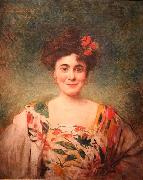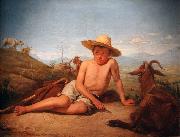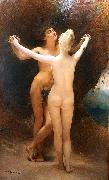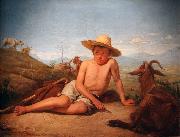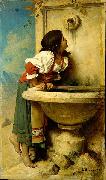Leon Joseph Florentin Bonnat Oil Painting ReproductionAll Leon Joseph Florentin Bonnat Oil Paintings(20 June 1833 - 8 September 1922) was a French painter. He was born in Bayonne, but from 1846 to 1853 he lived in Madrid, where his father owned a bookshop. While tending his father's shop, he copied engravings of works by the Old Masters, developing a passion for drawing. In Madrid he received his artistic training under Madrazo. He later worked in Paris, where he became known as a leading portraitist, never without a commission. His many portraits show the influence of Velezquez, Jusepe de Ribera and other Spanish masters, as well as Titian and Van Dyke, whose works he studied in the Prado. Following the period in Spain Bonnat worked the ateliers of the history painters Paul Delaroche and Leon Cogniet (1854) in Paris. Despite repeated attempts, he failed to win the prix de Rome, finally receiving only a second prize. However, a scholarship from his native Bayonne allowed him to spend three years in Rome (1858 - 60) independently. During his stay in Rome, he became friends with Edgar Degas, Gustave Moreau, Jean-Jacques Henner and the sculptor Henri Chapu. He won a medal of honor in Paris in 1869, going on to become one of the leading artists of his day. Bonnat went on to win the Grand Officer of the Legion d'honneur and became a professor at the Ecole des Beaux Arts in 1882. Bonnat was quite popular with American students in Paris. In addition to his native French, he spoke Spanish and Italian and knew English well, to the relief of many monolingual Americans. In May 1905 he succeeded Paul Dubois as director of the Ecole des Beaux-Arts. Bonnat "was a liberal teacher who stressed simplicity in art above high academic finish, as well as overall effect rather than detail," explains Julius Kaplan (see References). Bonnat's emphasis on overall effect on the one hand, and rigorous drawing on the other, put him in a middle position with respect to the Impressionists and academic painters like his friend Jean-Leon Gerôme. |
|||

|
|||
|
|
|||
|
||||||||
| Leon Joseph Florentin Bonnat (20 June 1833 - 8 September 1922) was a French painter. He was born in Bayonne, but from 1846 to 1853 he lived in Madrid, where his father owned a bookshop. While tending his father's shop, he copied engravings of works by the Old Masters, developing a passion for drawing. In Madrid he received his artistic training under Madrazo. He later worked in Paris, where he became known as a leading portraitist, never without a commission. His many portraits show the influence of Velezquez, Jusepe de Ribera and other Spanish masters, as well as Titian and Van Dyke, whose works he studied in the Prado. Following the period in Spain Bonnat worked the ateliers of the history painters Paul Delaroche and Leon Cogniet (1854) in Paris. Despite repeated attempts, he failed to win the prix de Rome, finally receiving only a second prize. However, a scholarship from his native Bayonne allowed him to spend three years in Rome (1858 - 60) independently. During his stay in Rome, he became friends with Edgar Degas, Gustave Moreau, Jean-Jacques Henner and the sculptor Henri Chapu. He won a medal of honor in Paris in 1869, going on to become one of the leading artists of his day. Bonnat went on to win the Grand Officer of the Legion d'honneur and became a professor at the Ecole des Beaux Arts in 1882. Bonnat was quite popular with American students in Paris. In addition to his native French, he spoke Spanish and Italian and knew English well, to the relief of many monolingual Americans. In May 1905 he succeeded Paul Dubois as director of the Ecole des Beaux-Arts. Bonnat "was a liberal teacher who stressed simplicity in art above high academic finish, as well as overall effect rather than detail," explains Julius Kaplan (see References). Bonnat's emphasis on overall effect on the one hand, and rigorous drawing on the other, put him in a middle position with respect to the Impressionists and academic painters like his friend Jean-Leon Gerôme. |
||||||||
|
|
||||||||
| Gemälde IDENTIFIZIERUNG:: 82088 Portrait de madame Dotezac Date 1902(1902) Medium Oil on canvas cjr |
||||||||
|
|
||||||||
| Gemälde IDENTIFIZIERUNG:: 83056 Giotto gardant les chevres Date 1850(1850) Medium Oil on canvas Dimensions 105 x 140 cm (41.3 x 55.1 in) cjr |
||||||||
|
|
||||||||
| Gemälde IDENTIFIZIERUNG:: 86866 Idylle 1890(1890) Medium Oil on canvas Dimensions 202 x 122.5 cm (79.5 x 48.2 in) cyf |
||||||||
|
|
||||||||
| Gemälde IDENTIFIZIERUNG:: 87223 Giotto gardant les chevres 1850(1850) Medium Oil on canvas Dimensions 105 x 140 cm (41.3 x 55.1 in) cyf |
||||||||
|
|
||||||||
| Gemälde IDENTIFIZIERUNG:: 91490 Roman Girl at a Fountain 1875(1875) Medium oil on canvas Dimensions 170.2 x 100.3 cm (67 x 39.5 in) cyf |
||||||||
|
|
||||||||
|
| VORHERIGER KÜNSTLER NÄCHSTER KÜNSTLER | |||||||
|
|
||||||||
|
Leon Joseph Florentin Bonnat (20 June 1833 - 8 September 1922) was a French painter. He was born in Bayonne, but from 1846 to 1853 he lived in Madrid, where his father owned a bookshop. While tending his father's shop, he copied engravings of works by the Old Masters, developing a passion for drawing. In Madrid he received his artistic training under Madrazo. He later worked in Paris, where he became known as a leading portraitist, never without a commission. His many portraits show the influence of Velezquez, Jusepe de Ribera and other Spanish masters, as well as Titian and Van Dyke, whose works he studied in the Prado. Following the period in Spain Bonnat worked the ateliers of the history painters Paul Delaroche and Leon Cogniet (1854) in Paris. Despite repeated attempts, he failed to win the prix de Rome, finally receiving only a second prize. However, a scholarship from his native Bayonne allowed him to spend three years in Rome (1858 - 60) independently. During his stay in Rome, he became friends with Edgar Degas, Gustave Moreau, Jean-Jacques Henner and the sculptor Henri Chapu. He won a medal of honor in Paris in 1869, going on to become one of the leading artists of his day. Bonnat went on to win the Grand Officer of the Legion d'honneur and became a professor at the Ecole des Beaux Arts in 1882. Bonnat was quite popular with American students in Paris. In addition to his native French, he spoke Spanish and Italian and knew English well, to the relief of many monolingual Americans. In May 1905 he succeeded Paul Dubois as director of the Ecole des Beaux-Arts. Bonnat "was a liberal teacher who stressed simplicity in art above high academic finish, as well as overall effect rather than detail," explains Julius Kaplan (see References). Bonnat's emphasis on overall effect on the one hand, and rigorous drawing on the other, put him in a middle position with respect to the Impressionists and academic painters like his friend Jean-Leon Gerôme. |
||||||||
|
|
||||||||
|
KONTAKTIEREN Sie UNS |





